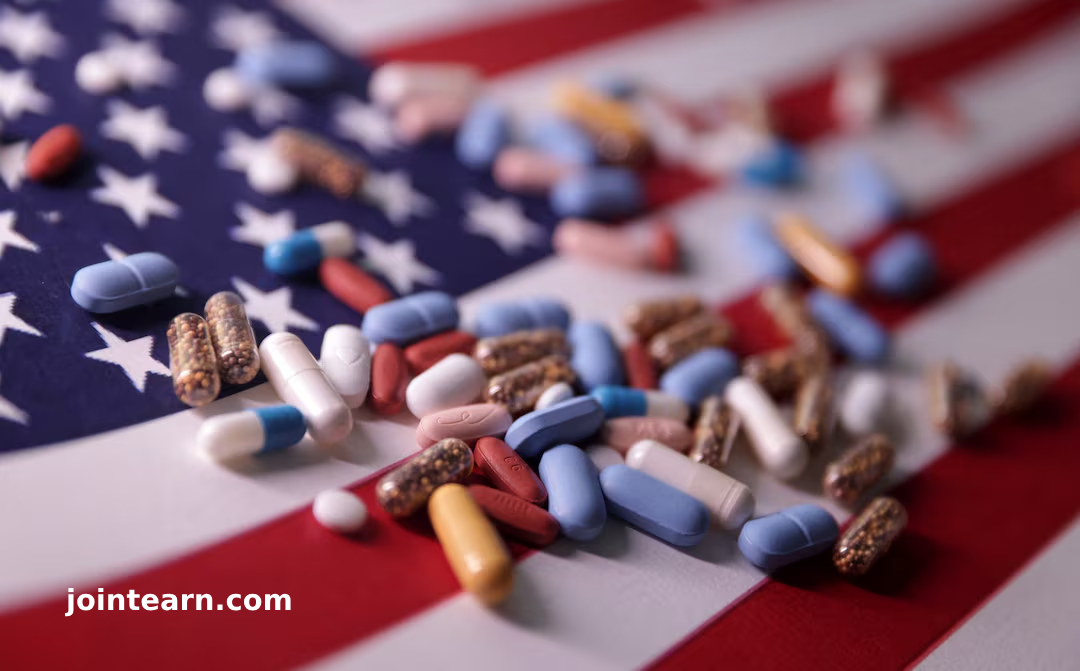A recent analysis has highlighted that a 25% U.S. tariff on pharmaceutical imports could drive up U.S. drug costs by a staggering $51 billion each year. If these tariffs are passed on, U.S. drug prices could rise by as much as 12.9%, the report commissioned by the Pharmaceutical Research and Manufacturers of America (PhRMA) reveals.
The study, conducted by Ernst & Young, analyzed the impact of pharmaceutical tariffs on the U.S. market, showing that the U.S. imported $203 billion worth of pharmaceutical products in 2023, with a significant 73% of these imports coming from Europe—primarily from Ireland, Germany, and Switzerland. U.S. sales of finished pharmaceuticals in 2023 totaled $393 billion.
Impact of US Pharmaceutical Tariffs on Drug Costs and Domestic Manufacturing
The report, which was not made public but was reviewed by Reuters, warns that imposing tariffs on pharmaceutical imports could severely affect the cost of drugs for American consumers. PhRMA, which represents major pharmaceutical companies like Amgen, Pfizer, and Eli Lilly, commissioned the study. The lobby group has long argued that tariffs could undermine U.S. efforts to boost domestic pharmaceutical manufacturing, a key goal for former President Donald Trump’s administration.
Despite the potential for tariff imposition, pharmaceutical products have traditionally been excluded from trade wars due to concerns over public health and the risk of skyrocketing drug costs. However, former President Trump has repeatedly proposed a 25% tariff on pharmaceutical imports, which has stirred significant debate in the industry.
US Trade Investigations Could Lead to Tariffs on Drug Imports
Recently, the U.S. administration announced investigations into pharmaceutical imports, citing national security concerns over the country’s reliance on foreign drug production. This move has sparked a 21-day public comment period led by the U.S. Commerce Department. Pharmaceutical companies see this as an opportunity to present their case that tariffs would hinder their ability to ramp up domestic drug production swiftly.
Drugmakers are lobbying for a phased implementation of tariffs on imported pharmaceuticals to mitigate the potential impact. Roche, a Swiss pharmaceutical giant, has directly petitioned the U.S. government for tariff exemptions, arguing that its imports are balanced by the export of U.S.-made drugs and diagnostics.
How US Pharmaceutical Tariffs Could Affect Drug Prices and Production Costs
The report also explains that production costs are not the only factor influencing drug prices. It remains uncertain whether tariffs on pharmaceutical imports—especially on intermediate ingredients or finished products—would result in price hikes passed on to consumers. However, Ernst & Young estimates that U.S. drug prices could increase by up to 12.9% if the full tariff burden is shifted onto domestic sales.
In 2023, approximately 30% of pharmaceutical imports were ingredients used in U.S. manufacturing, which were either exported or sold domestically. Tariffs on these ingredients could increase domestic production costs by 4.1%, making U.S.-made drugs less competitive globally. Moreover, the report highlights that around 25% of U.S. pharmaceutical output is exported, amounting to $101 billion in 2023. The imposition of higher tariffs on inputs could jeopardize around 490,000 export-related jobs in the U.S. pharmaceutical industry if foreign demand for U.S. drugs declines.
The Risk of Retaliatory Tariffs and Economic Impact on the Pharmaceutical Industry
The report did not account for the potential economic effects of retaliatory tariffs from trading partners, which could significantly impact U.S. pharmaceutical producers. Any retaliatory measures would likely exacerbate the challenges facing the U.S. pharmaceutical industry, potentially resulting in higher costs for both U.S. manufacturers and consumers.
Conclusion
The proposed U.S. tariffs on pharmaceutical imports present a complex issue for the U.S. pharmaceutical industry. While tariffs might provide short-term protection for domestic manufacturers, they could also result in substantial increases in drug costs for American consumers and harm the global competitiveness of U.S. pharmaceutical companies. As investigations continue, the industry will need to navigate these challenges carefully to balance domestic manufacturing goals with the needs of the global pharmaceutical market.












